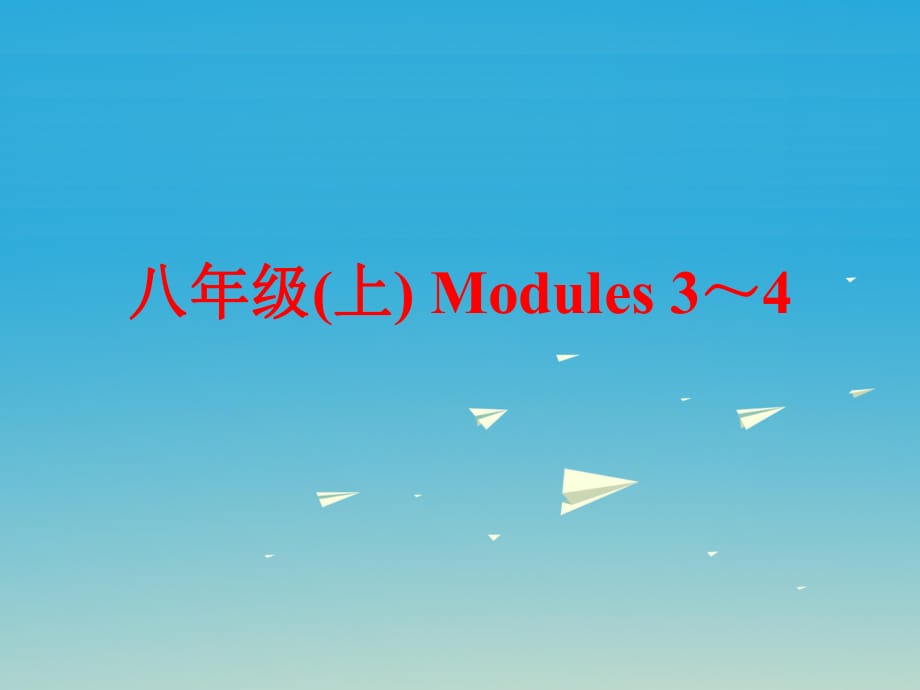《中考英語 第一部分 基礎(chǔ)夯實(shí) 八上 Modules 3-4復(fù)習(xí)課件 外研版》由會(huì)員分享�,可在線閱讀,更多相關(guān)《中考英語 第一部分 基礎(chǔ)夯實(shí) 八上 Modules 3-4復(fù)習(xí)課件 外研版(62頁珍藏版)》請(qǐng)?jiān)谘b配圖網(wǎng)上搜索�。
1、八年級(jí)(上) Modules 34 see sb.doing sth.現(xiàn)在分詞作賓補(bǔ)“看見某人在做某事”����,強(qiáng)調(diào)看見某個(gè)動(dòng)作正在進(jìn)行I saw a boy eating bananas. 我看見一個(gè)男孩正在吃香蕉。see sb.do sth.省略to的動(dòng)詞不定式作賓補(bǔ)“看見某人做過某事”�,強(qiáng)調(diào)看見了某個(gè)動(dòng)作發(fā)生的全過程I saw them get on the bus. 我看見他們上了公共汽車��。 except意為“除了之外”���,是不包括在整體內(nèi)部的“除了”����,即從整體中減去We all went to the zoo except our teacher.除了我們老師外,我們都去動(dòng)物園了�。(老師沒去
2、)besides意為“除了之外(還)”��,是包括在整體內(nèi)部的“除了”��,即再加上該部分We all went to the zoo besides our teacher.除了我們老師之外��,我們也都去動(dòng)物園了���。(老師也去了)except for意為“除之外”���,用在說明整體情況后,對(duì)細(xì)節(jié)加以糾正��,其后一般接名詞Except for some mistakes����,it is an excellent article.除了一些錯(cuò)誤�,它是一篇很優(yōu)秀的文章��。 八年級(jí)(上) Modules 34(訓(xùn) 練 時(shí) 間 : 60分 鐘 分 值 : 100分 ) 綜合能力提高一���、單項(xiàng)選擇(10分)1. Now its _
3�����、 for people to travel from one place to another than before. Aeasy Beasier Ceasiest Dthe easiest【解析】考查形容詞比較級(jí)�。由than可知用比較級(jí)�����,故選B��?!敬鸢浮緽 2. _ hard for me to work out that problem. AThats BThis is CIts DThey are【解析】考查it作形式主語的用法。本句結(jié)構(gòu)為“Itbe形容詞for sb.to do sth.”���,it作形式主語���,真正的主語是動(dòng)詞不定式�。故選C��?�!敬鸢浮緾 3. (2016南京) Look
4���、at the picture. Diana is _ Athe tallest Bthe shortest Ctaller than Jenny Dshorter than David【解析】考查形容詞的比較級(jí)和最高級(jí)。由圖片內(nèi)容可知��,John最高��,Jenny最矮���,而Diana比Jenny和David高��。故選C�����?!敬鸢浮緾 4. Football is _ popular than volleyball. Amost Bleast Cmore Dmuch【解析】考查形容詞比較級(jí)�。由than可知用比較級(jí),popular的比較級(jí)形式是more popular�����。【答案】C 5. (2016廣東) A
5�、mong the four seas off the coast of China, East China Sea is the second _ Adeep Bdeeper Cdeepest Dthe deepest【解析】考查最高級(jí)的用法。此處表示“第二最深的”�����,故所缺的詞是deepest���?����!敬鸢浮緾 6. Why do you like basketball? I like it_ it is very exciting. Abecause Bwhy Cwhat Dwhen【解析】考查原因狀語從句�����。由句意可知此處表示原因����,故用because引導(dǎo)從句����?�!敬鸢浮緼 7. (2016陜西)_
6���、you speak, _ your English will be. 【導(dǎo)學(xué)號(hào)35490006】 AThe less; the more BThe more; the better CThe less; the better DThe more; the less【解析】考查比較級(jí)的固定句式。句意為:你說得越多��,你的英語就會(huì)越好����。根據(jù)“The比較級(jí),the比較級(jí)”的結(jié)構(gòu)可知����,答案為B��?!敬鸢浮緽 8. _ is it from here to the railway station? About two kilometres. AHow long BHow much CHow soon DHo
7、w far【解析】考查特殊疑問詞的用法���。根據(jù)答語“About two kilometres.”可知是問距離����,故用how far提問��。【答案】D 9. Which sport do you like _�����, swimming, running or riding? Swimming. Agood Bbetter Cbest Dwell【解析】考查副詞最高級(jí)��。句意為“游泳��、跑步和騎車��,你最喜歡哪項(xiàng)運(yùn)動(dòng)�����?”“游泳��?���!比弑容^用最高級(jí),故選C�����?����!敬鸢浮緾 10. Whats the most expensive way to travel? _ ABy bike BOn foot CBy air DBy
8、 bus【解析】考查常識(shí)����。由常識(shí)可知,乘飛機(jī)是最昂貴的�����?�!敬鸢浮緾 1AfirstBsecondCthird【解析】由下文中的“My friend Peter came in first.”和“broke the tape a fraction of a second before me”可知�,“我”沒有贏得100米比賽,Peter 得了第一名����,他只比“我”快一點(diǎn)兒�,所以“我”得了第二名。故選B��?���!敬鸢浮緽2Afaster Bslower Chappier【解析】faster“更快地”�����;slower“更慢地”�;happier“更快樂的”����。由下文“broke the tape a fractio
9、n of a second before me”可知����,在最后20米他比“我”跑得快。故選A�����?!敬鸢浮緼 3Ajumper Brunner Cwalker【解析】jumper“跳高選手”;runner“跑步選手”�;walker“步行者”。由上文“I won the 400 meters.”可知�,“我”認(rèn)為“我”很可能更擅長長跑。故選B����?��!敬鸢浮緽4Ahand up Bshow off Ccatch up【解析】hand up“舉手”;show off“炫耀”����;catch up“趕上”。句意為“但是在長跑比賽中����,如果你起跑慢了,你還有時(shí)間趕上����。”故選C�。【答案】C 5A400 meters B10
10��、0 meters Chigh jump【解析】由上文“I won the 400 meters.”可知�����,此處指雖然“我”贏得了400米比賽��。故選A�。【答案】A6Awhat Bwhy Chow 【解析】由下文“I havent been doing enough training.”可知����,此處指“我”知道為什么“我”會(huì)比自己的最好成績(jī)慢了2秒。why意為“為什么”�����,符合題意�����。故選B����。【答案】B 7Aduring Bafter Cbefore【解析】句意為“明年�,我必須在體育日之前至少一個(gè)月投入訓(xùn)練”。before“在之前”��,符合題意�。故選C?!敬鸢浮緾8Aknocked down Bbroke
11���、down Cwent down 【解析】knock down“撞倒”;break down“打破”���;go down“沿著走”����。由下文“My left foot touched the bar just enough to knock it down.”可知���,“我”在第三次跳的時(shí)候撞掉了桿�。故選A�����?��!敬鸢浮緼 9Astudy Bwork Cpractice【解析】study意為“學(xué)習(xí)”�;work意為“工作”����;practice意為“訓(xùn)練”。句意為“如果我打算明年贏得跳高比賽的話����,那我就需要多訓(xùn)練?��!惫蔬xC�?���!敬鸢浮緾 1Why do many people like to travel by pl
12、ane?AIt is fast.BIt is safe.CYou can open the window.DYou can walk around.【解析】由第一段第二句“It is the fastest way.”可知選A�����?��!敬鸢浮緼 2Which is not the good thing about the train?AIt is safe.BIt takes a little more time.CYou can open the window.DYou can walk around.【解析】由第二段最后一句“But it takes a little more time.”可知
13��、選B��?�!敬鸢浮緽 3If you want to carry many things, you will go by _.AcarBbusCtrainDair【解析】由第三段倒數(shù)第二句“Also you can carry many things with you in a car.”可知選A�����?!敬鸢浮緼 4What is the bad thing about the car?AYou neednt go to a station.BYou can start your journey when you want to.CSometimes there are too many cars o
14、n the road.DYou cant see many interesting things on your way.【解析】由第三段最后一句“But sometimes there are too many cars on the road.”���,可知選C��?�!敬鸢浮緾 5What does the writer think of the plane, train and car?AHe thinks it takes a lot of time to get out of the airport and into the city.BHe likes to take a train because it takes a little more time.CHe likes to take a car because he has a car.DHe likes to take a plane because it is fast.【解析】由第一段內(nèi)容可知A項(xiàng)正確�����;花時(shí)間多是乘火車出行的缺點(diǎn)�����,故B項(xiàng)錯(cuò)誤�����;文中未提及作者是否擁有小汽車��,故C項(xiàng)錯(cuò)誤�;由第一段內(nèi)容可知D項(xiàng)錯(cuò)誤�����。【答案】A
 中考英語 第一部分 基礎(chǔ)夯實(shí) 八上 Modules 3-4復(fù)習(xí)課件 外研版
中考英語 第一部分 基礎(chǔ)夯實(shí) 八上 Modules 3-4復(fù)習(xí)課件 外研版

